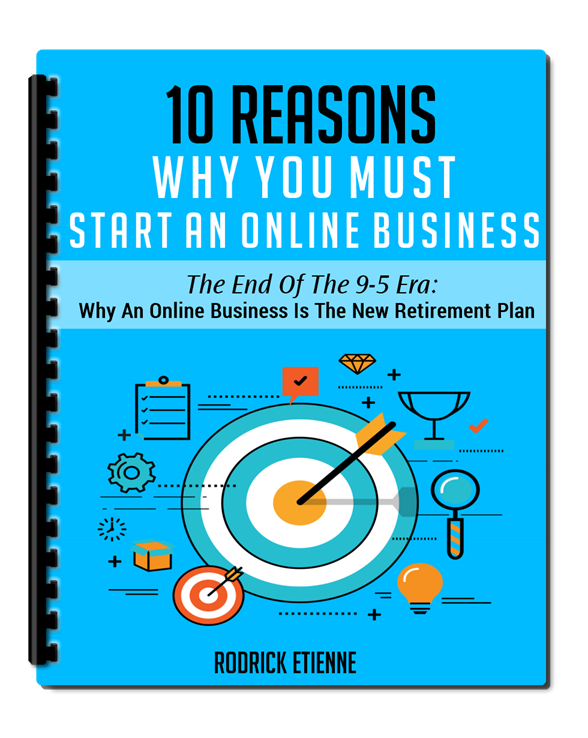Artificial Intelligence (AI) is no longer a futuristic idea—it’s here, shaping industries and changing how businesses…
10 Questions To Ask Yourself Before Starting A Business

Starting your own business is an exciting yet challenging endeavor requiring more than a great idea.
Entrepreneurs are visionaries who see possibilities where others see obstacles, but turning that vision into reality involves careful planning, self-reflection, and understanding.
The road to success is rarely straightforward, and many challenges can catch even the most determined business owner off guard.
Before leaping, it’s important to pause and ask yourself the right questions.
What motivates you, and are you prepared for the risks?
How will you handle setbacks, and do you have a clear vision for your goals?
This article is crafted specifically for entrepreneurs like you—those with big dreams and the determination to make them happen.
These 10 questions are designed to guide you through self-assessment and strategic thinking, helping you build a solid foundation for your business and steer you confidently toward success.
1)) What Problem Am I Solving?
Before starting a business, it’s essential to identify the specific problem you are addressing.
Successful businesses are built around solving meaningful challenges that resonate with their target audience.
Ask yourself what gaps exist in the market and how your product or service provides a solution that adds value to people’s lives.
Understanding the problem isn’t just about knowing what’s missing—it’s about deeply connecting with the needs, frustrations, and desires of your potential customers.
By focusing on a clear problem, you can create a solution tailored to meet real demands, which will set your business apart and create a strong foundation for growth.
A clear purpose not only drives innovation but also attracts customers and investors who believe in the value of what you’re creating.
2)) Who Is My Target Audience?
Understanding your target audience is crucial to building a business that resonates with the right people.
Your audience consists of the individuals who will benefit most from your product or service, so it’s important to define who they are with precision.
Consider their demographics, such as age, location, gender, and income level, but also focus on their behaviors, needs, and pain points.
What are their goals, and how does your solution align with their expectations?
By developing a clear picture of your ideal customer, you can tailor your messaging, branding, and marketing efforts to connect with them authentically.
This process not only drives engagement but also ensures that your offerings are relevant and valuable to the people who matter most to your business.
Understanding your audience fosters loyalty and opens the door to meaningful relationships that fuel long-term success.
3)) What Is My Unique Value?
Setting your business apart requires a deep understanding of what makes your product or service unique.
Your unique value lies in the distinctive qualities and benefits that you offer to customers—features that they can’t find elsewhere.
Consider what makes your solution stand out in a crowded marketplace.
Is it a groundbreaking design, exceptional quality, personalized customer experience, or perhaps how it addresses an overlooked pain point?
Defining your unique value is not only about differentiation but also about creating a compelling reason for customers to choose you over competitors.
It’s the foundation of your brand identity and serves as a key driver for loyalty and trust.
By identifying and leveraging your unique strengths, you can build a powerful narrative that attracts the right audience and positions your business as the go-to solution for their needs.
4)) Do I Have A Solid Business Plan?
A solid business plan is an essential tool for turning your vision into a reality and ensuring long-term success.
It serves as a roadmap, outlining your goals, strategies, and the steps you need to take to achieve them.
A well-crafted business plan should address key aspects of your business, such as your mission, market analysis, financial projections, and operational structure.
It demonstrates that you have thoroughly researched your industry and have a clear understanding of how to compete effectively.
A strong plan not only guides your daily decisions but also proves invaluable when seeking investors or securing loans, as it conveys credibility and commitment.
By dedicating time to developing a comprehensive business plan, you lay a strong foundation that keeps you focused, adaptable, and better equipped to overcome challenges as they arise.
5)) What Is My Budget And Funding Source?
Understanding your budget and funding sources is a crucial step in building a sustainable business.
Your budget lays out the financial framework for your operations, highlighting what resources are available and how they will be allocated.
Begin by outlining all potential startup costs, including equipment, employee wages, marketing efforts, and other operational expenses.
Having a detailed estimate of your costs allows you to determine how much funding you need to get started and stay afloat during the early stages of your business.
Once your budget is clear, consider the various funding options available to you, such as personal savings, bank loans, venture capital, or crowdfunding.
Evaluate the pros and cons of each method to ensure they align with your financial goals and growth strategies.
By carefully analyzing your budget and securing reliable funding, you establish a solid financial backbone that supports your vision and allows you to grow with confidence.
6)) What Are My Short And Long-Term Goals?
Defining both short and long-term goals is a vital component of building a successful business.
Your short-term goals represent immediate milestones, focusing on tasks that can be achieved shortly, such as launching a product, gaining a specific number of customers, or reaching a monthly revenue target.
These more immediate objectives are instrumental in creating momentum and setting the pace for growth.
On the other hand, long-term goals involve shaping the broader vision of your business, such as expanding to new markets, developing a comprehensive product line, or solidifying your position as an industry leader.
These goals require strategic planning and patience, as they align your daily actions with your overarching aspirations.
Balancing short and long-term objectives ensures you stay grounded while steadily working towards bigger achievements.
Tracking your progress along the way helps maintain focus, celebrate successes, and refine your direction as needed to keep your business on its path to growth and sustainability.
7)) Do I Understand The Competition?
Understanding the competition is a critical step in any business strategy, as it allows you to identify what sets your company apart while addressing potential threats in your market.
Begin by conducting thorough research to learn who your key competitors are, what they offer, and how they position themselves.
Take note of their strengths, such as pricing, customer loyalty, or product features, while carefully analyzing their weaknesses and gaps in their offerings where your business might excel.
This knowledge provides you with valuable insights into market trends and customer expectations, enabling you to refine your approach and stay ahead.
Being aware of your competition not only helps you craft a strong value proposition but also fosters innovation by challenging you to think creatively and find new ways to improve.
The ability to anticipate and respond effectively to your competitors’ strategies ensures that your business remains relevant, competitive, and capable of thriving in a dynamic marketplace.
8)) How Will I Market My Business?
A well-defined marketing strategy is essential for building awareness and attracting customers to your business.
Begin by identifying your target audience and understanding their needs, preferences, and behaviors.
Tailoring your messaging and outreach to resonate with your ideal customers ensures your efforts are impactful and results-driven.
Use a mix of traditional and digital marketing channels to maximize exposure, such as social media, email campaigns, content marketing, and even in-person events or sponsorships.
Social media platforms can help you engage with your audience directly, while effective website and SEO practices improve visibility in online searches.
Equally important is tracking the performance of your marketing efforts through measurable metrics like engagement, conversion rates, and return on investment.
Regularly reviewing these insights allows you to adjust your strategy, allocate resources effectively, and stay connected with your audience in meaningful ways.
By committing to a thoughtful and dynamic marketing approach, your business can build a strong presence and maintain long-term relationships with customers.
9)) What Is My Risk Tolerance?
Understanding your risk tolerance is a crucial aspect of managing and growing your business effectively.
It involves evaluating how much uncertainty and potential loss you are willing and able to endure while pursuing new opportunities.
Everyone has a unique threshold for risk, shaped by factors like financial stability, industry knowledge, and personal mindset.
Being honest about your comfort level with risk helps you make informed decisions that align with your overall strategy.
High-risk ventures, while potentially offering significant rewards, require careful planning and a robust contingency framework to mitigate potential downsides.
Conversely, a more conservative approach might focus on steady and gradual growth while avoiding overexposure to volatile circumstances.
Striking the right balance between risk-taking and caution ensures that your business remains adaptable and resilient in the face of challenges.
By acknowledging and respecting your boundaries, you establish a foundation that supports both bold initiatives and prudent safeguards, enabling you to achieve sustainable progress over time.
10)) Am I Ready To Commit Fully?
Committing fully to a business venture requires a deep level of self-awareness and dedication.
It involves more than just investing resources or time; it demands a mindset focused on perseverance, adaptability, and a willingness to tackle challenges head-on.
This kind of commitment often means prioritizing your business above personal comforts and being prepared to make sacrifices where necessary.
Ask yourself if you are ready to dedicate your energy and attention to consistently driving your vision forward, regardless of obstacles.
Full commitment also requires surrounding yourself with the right support system—whether it’s a team, mentors, or a network that shares your ambitions.
Knowing your motivations and aligning them with your goals helps solidify your resolve, providing the fuel needed to overcome inevitable setbacks.
True commitment doesn’t waiver in the face of hardships; it evolves and strengthens, ensuring you’re prepared to put everything on the line for the success and growth of your business.
Conclusion
Entrepreneurship is a journey filled with challenges, decisions, and opportunities, and this article serves as a guide to help you evaluate key aspects of that path.
Whether it’s understanding your competition, crafting a marketing strategy, assessing your risk tolerance, or committing fully to your venture, each step requires intentional thought and preparation.
Entrepreneurs must constantly adapt, innovate, and make choices that reflect their vision and goals.
With a clear focus on these foundational elements, you can build a business that not only thrives in a competitive market but also evolves to meet the changing dynamics of your industry.
By reflecting on the questions posed throughout this article, you can better equip yourself to tackle uncertainties with confidence and determination.
Remember, success isn’t defined solely by financial gains—it’s about realizing your vision, growing through challenges, and creating value for your customers and community.
This reflective process is what distinguishes a great entrepreneur, laying the groundwork for a fulfilling and impactful entrepreneurial journey.





